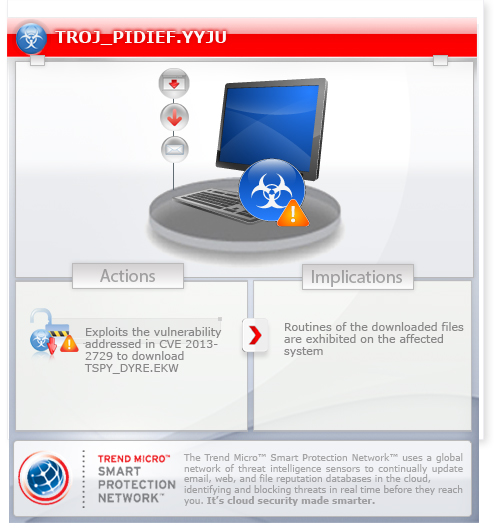TROJ_PIDIEF.YYJU
PDF/Exploit.CVE-2013-2729.G (ESET)
Windows


Threat Type: Trojan
Destructiveness: No
Encrypted: Yes
In the wild: Yes
OVERVIEW
This malware exploits the CVE-2013-2729 vulnerability, which leads to the download of a DYREZA malware. The said downloaded DYREZA variant has the capability to steal banking and bitcoin information.
To get a one-glance comprehensive view of the behavior of this Trojan, refer to the Threat Diagram shown below.

This Trojan arrives as an attachment to email messages mass-mailed by other malware/grayware or malicious users. It arrives on a system as a file dropped by other malware or as a file downloaded unknowingly by users when visiting malicious sites.
It executes the downloaded files. As a result, malicious routines of the downloaded files are exhibited on the affected system.
However, as of this writing, the said sites are inaccessible.
TECHNICAL DETAILS
Arrival Details
This Trojan arrives as an attachment to email messages mass-mailed by other malware/grayware or malicious users.
It arrives on a system as a file dropped by other malware or as a file downloaded unknowingly by users when visiting malicious sites.
Download Routine
This Trojan accesses the following websites to download files:
- http://{BLOCKED}ahore.com/Resources/Search/1510out.exe - detected as TSPY_DYRE.EKW
It takes advantage of the following software vulnerabilities to download possibly malicious files:
It then executes the downloaded files. As a result, malicious routines of the downloaded files are exhibited on the affected system.
Other Details
However, as of this writing, the said sites are inaccessible.
SOLUTION
Step 1
Before doing any scans, Windows 7, Windows 8, Windows 8.1, and Windows 10 users must disable System Restore to allow full scanning of their computers.
Step 2
Remove malware/grayware files dropped/downloaded by TROJ_PIDIEF.YYJU. (Note: Please skip this step if the threats listed below have already been removed.)
Step 3
Scan your computer with your Trend Micro product to delete files detected as TROJ_PIDIEF.YYJU. If the detected files have already been cleaned, deleted, or quarantined by your Trend Micro product, no further step is required. You may opt to simply delete the quarantined files. Please check the following Trend Micro Support pages for more information:
Did this description help? Tell us how we did.


